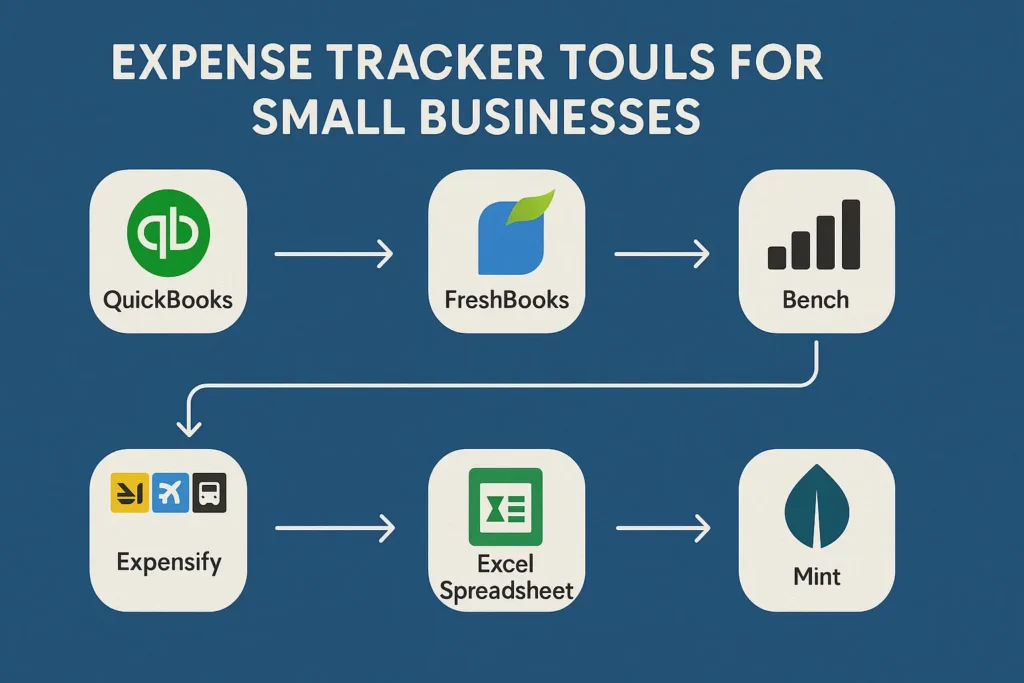Managing expenses is one of the most crucial aspects of running a small business. Whether you’re just getting started or scaling operations, having the right expense tracker can help you maintain financial clarity, optimize your cash flow, and stay compliant with taxes. In 2025, technology has made this process even easier with the use of automated and user-friendly tools. Let’s explore six of the best expense tracker tools tailored for small business owners.
Table of Contents

Best Expense Tracker Tools for Small Businesses in 2025
1. QuickBooks Online
QuickBooks remains a leader in accounting and expense tracking for small businesses. Its cloud-based system allows users to manage expenses, generate reports, track mileage, and sync with bank accounts in real time. The automation features save hours of manual entry, and its mobile app makes it perfect for on-the-go tracking.
Best for: Businesses that need robust accounting with integrated expense management.
2. FreshBooks
Known for its clean interface and intuitive design, FreshBooks is ideal for small businesses that prioritize simplicity. It allows for automatic expense tracking by connecting to your bank account, categorizes transactions, and provides features for invoicing and time tracking.
Best for: Freelancers and service-based businesses seeking an all-in-one platform.
3. Expensify
Expensify is perfect for tracking receipts, managing employee reimbursements, and streamlining expense reports. Snap a photo of your receipt and let Expensify do the rest — from categorizing to syncing with your accounting software.
Best for: Small teams that frequently deal with reimbursements and travel expenses.
4. Bench
Bench is more than just an expense tracker; it offers full-service bookkeeping. This tool helps categorize expenses and sends you monthly financial statements to review. Their team of professionals ensures your books stay up to date.
Best for: Business owners who want expert bookkeeping help with built-in expense tracking.
5. Excel or Google Sheets
Despite the boom in cloud software, spreadsheets remain a popular and effective option for businesses that prefer manual control. You can build custom templates or download pre-designed trackers to suit your needs.
Best for: Entrepreneurs who want a free or ultra-customized solution with offline flexibility.
6. Mint (by Intuit)
Mint remains a trusted tool, especially for solopreneurs and freelancers. Its budgeting and expense tracking features are free and include reminders for bills, insights into spending trends, and multi-device access.
Best for: Individuals and freelancers seeking a free tool to track both personal and business expenses.

Conclusion
Keeping track of expenses doesn’t have to be tedious or expensive. With the tools above, small businesses can find the right platform that fits their unique needs in 2025. Whether you’re looking for a fully automated solution or a more hands-on approach, there’s a tool that can streamline your finances.
Need personalized help managing your business expenses? Contact Profitjets today to get expert guidance on the best accounting and expense tracking solutions tailored for your business.
Frequently Asked Questions
1. What is the best free expense tracker for small businesses in 2025?
Mint is one of the best free tools, offering budgeting, reminders, and syncing across multiple devices.
2. Can I integrate expense tracking tools with my accounting software?
Yes. Most modern tools, such as QuickBooks, Expensify, and FreshBooks, offer seamless integrations.
3. Are spreadsheets still effective for expense tracking in 2025?
Yes, especially for small businesses that prefer complete control and customization over automation.
4. Which expense tracker is best for teams?
Expensify is a top choice for small teams, offering easy reimbursement workflows and multi-user access.
5. Why is expense tracking important for small businesses?
It helps control cash flow, prepares you for tax filing, ensures financial transparency, and supports better decision-making.





